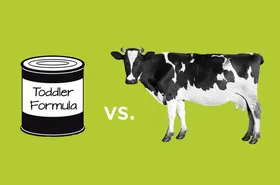Why Healthy Eating Matters in Your Baby’s First 1000 Days
Updated October 3, 2024

A baby’s first 1000 days of life, spanning from conception to one’s second birthday is referred to as the “window of opportunity” by the CDC. This is a period of time when optimal nutrition is deemed absolutely crucial for healthy development and growth, as well as setting the child up for lifelong health. During this specifically sensitive time, the brain develops the most rapidly and thus is more vulnerable to damages caused by nutritional deficiencies and other stressors, such as exposures to toxins. For pregnant mothers, parents, and caretakers, it is extremely important to take notice of the baby’s growth and feeding patterns and to make sure one is consuming enough macro and micronutrients to support healthy development.
The following information has been gathered from various sources, including scientific literature, health organization sites, and a conversation with one of Else Nutrition’s corresponding pediatricians, Dr. Leah Alexander, M.D., FAAP.
During Pregnancy
Pregnancy is a very unique time as it places a great deal of demand on the mother’s body in order to support the growing fetus. The body is very sensitive to external stressors and exposures, as well as what consists of diet and nutrition. To meet these increased demands, the mother’s health is important and should be maintained as best as possible while adjusting to personal preferences and experiences. According to the literature, expecting mothers should place emphasis on consuming foods (and supplementing when necessary) that provide balanced macronutrients (protein, carbs, and fat) as well as micronutrients such as folate (even before conception and mainly in the 1st trimester), iron, omega-3 fatty acids (most important during the 3rd trimester), iodine, carotenoids, choline, and vitamin D (Beluska-Turkan et al). Consulting with a health professional throughout pregnancy for any concerns is recommended.
First Six Months After Birth – breast is best
In the child's first six months after birth, the most critical focus should be on providing sufficient calories for healthy weight gain and growth. The best way is by exclusive breastfeeding, which is most recommended for its many benefits for both baby and mother. If that is not possible, infant formula is advised. Dr. Alexander emphasized that the important focus should be on paying attention to the baby’s growth and needs and adjusting accordingly. This is the only period in the life of a healthy individual where a sole source of nutrition is recommended.
From Six Months and Up – starting solid foods
At around six months of age or slightly before/after, solid foods should be introduced for both nutritional and developmental needs. Introduce as much variety as possible to expose the infant to different flavors and textures. This is key in developing the baby's palate for the future and getting them comfortable with different types of food. American Dietary Guidelines emphasize the avoidance of added sugars at that age, which is crucial for palate development, and it is also advised to introduce new food each week to enhance new food acceptance.
Dr. Alexander recommends gradually introducing common allergenic foods at this stage as well, contrary to the recommendation in the past to withhold them. This includes foods such as nuts, nut kinds of butter or powders, and proteins like eggs and fish. Introducing allergenic foods starting at this age will aid in expanding the baby's palate and evidence suggests that it can reduce the chances of developing food allergies.
Although the emphasis should be on feeding the infant a healthy, varied diet consisting of primarily whole foods, this may not be feasible or realistic for all families. In this case, it is important to focus on quality over quantity. If possible, choosing alternative brands that prioritize whole food ingredients with less processing and additives is preferable.
Dr. Alexander no longer recommends infant rice cereal or rice products as first foods for babies due to their higher levels of inorganic arsenic. This is based on new recommendations from the AAP and CDC. Many parents may be unaware of this information due to its recent development. Instead of rice cereals/products, Dr. Alexander suggests using other types of grains such as oats, buckwheat, or wheat.
12 Months and Up – starting to eat from the family menu
Building up a diverse palate is most important as a child enters their toddler years because that is when unhealthy food habits may be established. Especially in the ages of one to three years, children are particularly vulnerable “because they typically ingest a diet similar to that of their adult parents” – meaning they may be “susceptible to poor parental food habits” or food insecurity which can negatively impact food quality (Cusick et al). Additionally, other influences like school and daycare may cause a child to become pickier and prefer less healthy options. The important thing is to keep offering healthier options at home and to eat together as a family to model those healthy eating patterns. As much as possible, the focus should stay on the quality of the food rather than just “feeding food” to the child.
If nutritional supplementation is deemed necessary, Dr. Alexander recommends that parents be cautious of misleading claims and do their research when choosing a supplement. Many foods commonly advertised as healthy for infants and toddlers are actually full of added sugars and other processed ingredients, which may not be the best for a growing child’s health. When struggling to feed a picky child, relying on meal replacement products such as nutritional drinks may ease a concerned parent’s worries. However, even products labeled as a ‘nutritional supplement’ are not automatically health-promoting and rather may contribute to other issues for the child. It is best to speak with a healthcare professional to seek advice on how to properly nourish a child who is refusing to eat a variety of food.
For meal ideas and more information on nutrition for babies and toddlers, there are plenty of resources on Else Nutrition’s Blog:
The content and advice provided in this article is for informational purposes only and is not a substitute for medical diagnosis, treatment, advice for specific medical conditions. Always consult a pediatrician to understand the individual needs of your child.
References:
https://www.ncbi.nlm.nih.gov/pmc/articles/PMC4981537/
https://publications.aap.org/aapnews/news/9138








